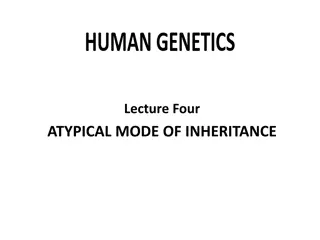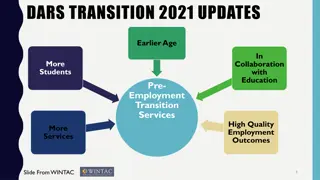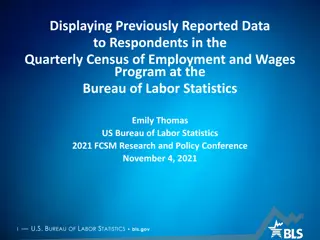Understanding Atypical Forms of Employment
Exploring atypical forms of employment and new work structures, this content discusses deviations from standard employment contracts, challenges faced by workers, strategies for coping with protection deficits, and the perspectives of both employers and employees. It covers topics such as part-time work, fixed-term employment, temporary agency work, and reasons why employers and employees may opt for atypical employment arrangements.
Download Presentation

Please find below an Image/Link to download the presentation.
The content on the website is provided AS IS for your information and personal use only. It may not be sold, licensed, or shared on other websites without obtaining consent from the author. Download presentation by click this link. If you encounter any issues during the download, it is possible that the publisher has removed the file from their server.
E N D
Presentation Transcript
Atypical work and new forms of employment Martin Risak Department of Labour Law and Law of Social Security
Overview Atypical employment Deviations from the standard employment contract Strategies to cope with protection defecits for workers The next step: new forms of employment What is so new about them? One example: crowdwork Martin Risak Atypical and new forms of employment 2
Standard (typical) employment Full-time open-ended employment contracts with some kind of security Issues and counter-strategies Wages: collective bargaining and statutory minimum wages Termination: general protection and special protection for certain groups Times of non-performance (esp. illness, annual leave): continuation of payment, social benefits Extensive working hours: working time laws Unilateral decisions affecting employee-interests: information/consultation/co-determination Martin Risak Atypical and new forms of employment 3
Atypical employment Three main forms of atypical employment Part-time work Fixed-term employment Temporary agency work (triangular employment relationships) Other forms of atypical employment Seasonal work, telework, family work, self- employment Not that prevalent in the past -> some come up again as new forms of employment Martin Risak Atypical and new forms of employment 4
Atypical employment: why? The employer perspective Added flexibility avoiding the risks (and costs) associated with standard employment (and the legal benefits for workers that come with it) Reducing the risk of paying for unproductive time Avoiding the difficulties (and/or costs) connected with dismissal protection Shifting risks to employees, temporary-work agencies or contractors Avoiding costly collective bargaining agreements Martin Risak Atypical and new forms of employment 5
Atypical employment: why? The employee perspective Added flexibility to combine (paid) work with other activities (e.g. childcare, household-duties, education, self-employment) Job creation Job opportunities for persons excluded from standard employment But: lack of entitlements and benefits associated with standard employment Martin Risak Atypical and new forms of employment 6
Legal strategies on the EU-level Part-time work (Directive 97/81/EC concerning the Framework Agreement on part-time work) Principle of non-discrimination, principle of pro-rata temporis Opportunities for part-time work (transfers from full-time to part-time and vice versa) Fixed term contracts (Directive 1999/70/EC concerning the framework agreement on fixed-term work) Principle of non-discrimination Measures to prevent abuse from successive fixed-term employment contracts Information and employment/training opportunities Martin Risak Atypical and new forms of employment 7
Legal strategies on the EU-Level Temporary agency work (Directive 2008/104/EC) Principle of equal treatment Access to employment, collective facilities and vocational training Representation of temporary agency workers Outsourcing (Directive 2001/23/EC transfer of undertakings) Safeguarding of employees rights (employment contracts, collective agreements, dismissal, representation) Information and consultation Martin Risak Atypical and new forms of employment 8
And now: New forms of employment Eurofound (2015) Need for increased flexibility for both employers and workers What is new ? Transformation of the traditional one-to-one relationship between employer and employee: employee-sharing, job- sharing, interim management Unconventional work patterns: portfolio work, crowd employment, collaborative employment Unconventional places of work: information and communication technology (ICT)-based work Irregular provision of work: casual work (zero-hours contracts) Martin Risak Atypical and new forms of employment 9
New forms of employment Martin Risak Atypical and new forms of employment 10
Remember outsourcing? Sending jobs to India and China is so 2003. The new pool of cheap labor: everyday people using their spare cycles to create content, solve problems, even do corporate R & D. For the last decade or so, companies have been looking overseas, to India or China, for cheap labor. But now it doesn t matter where the laborers are they might be down the block, they might be in Indonesia as long as they are connected to the network. Martin Risak Atypical and new forms of employment 11
The labor isnt always free, but it costs a lot less than paying traditional outsourcing; it s crowdsourcing. employees. It s not (Jeff Howe, The Rise of Crowdsourcing, WIRED magazine 10.2006) Martin Risak Atypical and new forms of employment 12
Crowdsourcing: How does it work? Crowd- sourcer Plat- form Crowd- worker Internal external crowdsourcing Different types of tasks Martin Risak Atypical and new forms of employment 13
How does it work in practice? www.mturk.com Martin Risak Atypical and new forms of employment 14
Martin Risak Atypical and new forms of employment 15
Martin Risak Atypical and new forms of employment 16
Major issues for crowdworkers in practice Low wages Job insecurity Social and professional isolation Unfair general terms & conditions (T&Cs) Right not to accept completed task without having to give a reason nor payment Reputation mechanisms No direct contact with crowdsourcers (esp. feed-back for rejections) Martin Risak Atypical and new forms of employment 17
Two legal questions (and one follow-up question) Who are the contractual partners? What kind of contract exists between them? Do minimum wages apply? Martin Risak Atypical and new forms of employment 18
Contractual Partners Crowd- sourcer Plat- form Crowd- worker Platform is only a broker and acts as an agent for the crowdsourcer Platform is sole contracting partner of the crowdsourcer crowdworkers are subcontractors of the platform Martin Risak Atypical and new forms of employment 19
Contractual Partners Crowd- sourcer Plat- form Crowd- worker Is there a direct contractual relationship? When is the contract concluded? Right to reject completed tasks (T&Cs)? What kind of contract? Employment contract or contract for services? Martin Risak Atypical and new forms of employment 20
Contractual Partners Crowd- sourcer Plat- form Crowd- worker Is there a direct contractual relationship? What kind of contract? Martin Risak Atypical and new forms of employment 21
Employment Relationship? Contra employment relationship Workers choose when, where and what to work Very short duration of the contract Perception/agreement of the parties that no employment contract is concluded Pro employment relationship Every task a fixed term contract Tight virtual controls Performance management via reputation system Martin Risak Atypical and new forms of employment 22
Thank you very much for your interest and attention! Assoc.-Prof. Martin Risak, PhD Department of Labour Law and Law of Social Security University of Vienna Schenkenstrasse 8 10, 1010 Wien, AUSTRIA martin.risak@univie.ac.at http://www.univie.ac.at/arbeitsrecht Martin Risak Atypical and new forms of employment 23























